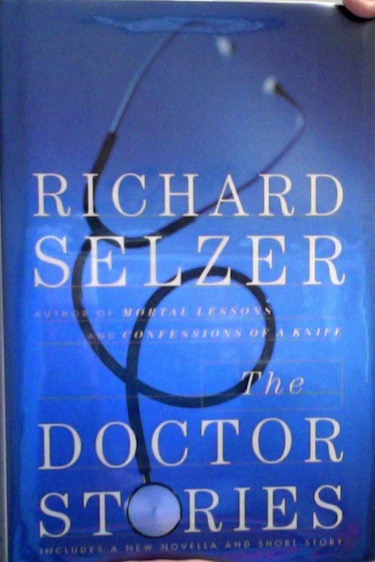Inspiring Older Readers
 posted on 20 Apr 2022
posted on 20 Apr 2022
The Doctor Stories by Richard Selzer
I don’t think the name of Richard Selzer is particularly well-known on this side of the Atlantic. He was a surgeon-writer and educator who died in 2016 aged eighty-seven who began writing as a medical officer in Korea in the mid-50s. Throughout his life as a busy surgeon he used the sleepless small hours and the lulls during surgery to produce a body of work that included essays, memoirs and over a hundred short stories. He was also professor of medicine at Yale for over twenty-five years and is credited with pioneering the use of creative writing in medical education. He once said that the story of his life was “blood and ink”.
The greatest of Selzer’s stories are those that cleave closest to his own experience and focus on illness, caring, surgery, the medical profession. They are unflinching, sometimes uncomfortable reading, humane but alert to the paradoxes and cruelties of both illness and how it is sometimes necessary to treat illness. They are written with a vivid, visceral relish that is not for the squeamish and there were times when I found myself sometimes reading compulsively even as I tried to turn my head away.
Selzer excels at what we might call the morality of suffering, in particular the sometimes partial truths and platitudes we resort to to describe and perhaps tame these experiences: the courageous battles of those who fight their illness, the ennoblement of those who suffer, the selflessness of those who care. One extraordinary and almost unbearably painful story will serve as an example. In ‘Tube feeding’, a man goes through the daily routine of tube-feeding his wife who can no longer swallow solid food because of an immense, inoperable tumour. On this particular morning, his wife’s tube slips out and he must reintroduce it. After the process she hears him being sick as discreetly as he can in a downstairs lavatory. Somehow, love and compassion persist. It is a story that has the undeniable smell of the real about it, as do many others. But this alone would not necessarily commend them: what makes his finest stories so remarkable is that in addition to suffering they also have grace and beauty.
But there is also another side to Selzer’s work which to my mind is less successful and these are his non-medical stories. Typically these have little to do with medicine as such, though they often feature suffering or crisis of some kind; many have a historical or geographically exotic setting, and they are almost always more literary in a somewhat self-conscious way – sometimes fable-like, sometimes macabre, sometimes more experimental.
These more writerly stories leave me with the impression that at some point Selzer (or perhaps more likely, his publisher) decided that a body of work made up predominantly of stories about illness and suffering would appeal to only a very small audience and that in the interest of future sales, he must extend his range. But of the non-medical stories I have read none of them are the equal of the medical stories and consequently the collection seems uneven. This is a great shame. Selzer has also written: “A doctor/writer is especially blessed in that he walks about all day in the middle of a short story. There comes that moment when he is driven to snatch up a pencil and jot it down. Only, he must take care that that the pencil be in flames and that his fingers be burnt in the act.” It is an argument for gravity and seriousness of purpose and the avoidance of fine writing for its own sake. I’m not sure that he was always successful in following his own advice.
It would be a great service I think and ultimately good for Selzer’s reputation if a UK publisher would issue a nicely produced single volume paperback containing just the very best of his medical stories. You might need a strong stomach for it but it would be a genuinely great collection.
Alun Severn
April 2022
Doctor-writers elsewhere on Letterpress
Pen and Scalpel: The new school of surgeon-writers
On the Move: A Life – the autobiography of Oliver Sacks
Insomniac City: New York, Oliver & Me by Bill Hayes (a memoir of Oliver Sacks by his partner)
When Breath Becomes Air by Paul Kalanithi